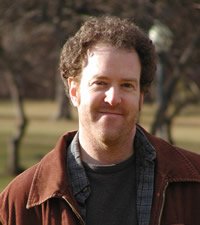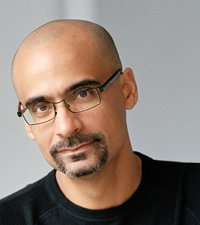SU alumnus named a National Book Award finalist
Steve Sheinkin '90 nominated for book about race to build atomic bomb

Syracuse University alumnus Steve Sheinkin ’90 has been named a finalist in the Young People’s Literature category of the 2012 National Book Awards. A former international relations major in The College of Arts and Sciences, Sheinkin was nominated for “Bomb: The Race to Build—and Steal—the World's Most Dangerous Weapon” (Flash Point, 2012), a factually accurate account about the making of the atomic bomb.
Sheinkin and 19 other finalists will be recognized at the National Book Awards Ceremony on Wednesday, Nov. 14, at Capriani Wall Street in New York City.
“I had no idea I was even nominated for the award,” says Sheinkin, speaking by phone from his office in Saratoga Springs, N.Y. “When the book came out in September, I just put it out of my head--until I found out my publisher submitted it for consideration.”
A self-described international spy thriller, “Bomb” opens with German scientists discovering how to split uranium atoms and, thus, create the world’s most formidable weapon. When they begin sharing their findings with colleagues around the globe, World War II breaks out—and the race is on to build the atomic bomb.
“Bomb” uniquely weaves together three story lines: the development of the American bomb project, led by Robert Oppenheimer, at the mountaintop lab of Los Alamos in New Mexico; the Soviet Union’s attempt to infiltrate Los Alamos and steal American bomb-making secrets; and the equally important race to stop Adolf Hitler from getting his hand on the bomb.
“The source material was so rich and the cast of potential characters was so vast that this book could have been hundreds of pages long,” says Sheinkin. “The challenge was deciding what to leave out.”
A former textbook writer, Sheinkin says he wrote “Bomb” partly out of his love for spy thrillers and partly out of his disdain for history textbooks. (“I remember being bored by them, as a teenager,” he says of the latter.) That he is a nonfiction writer by trade and “can’t just make stuff up” makes the readability of “Bomb” all the more impressive.
The key, says Sheinkin, is finding the right story and then playing up elements that appeal to young readers: a clear, fast-paced style; high-stakes action; quirky characters; and snappy dialogue. “Bomb” has been praised for its “prodigious research and storytelling skill” (Kirkus Book Reviews) and for “maintaining the pace of a thriller without betraying history … or skipping over science” (The Horn Book).
“I guess I’m nervous about losing readers, if I don’t keep things moving,” he says.
Sheinkin is also author of “The Notorious Benedict Arnold: A True Story of Adventure, Heroism, and Treachery” (Flash Point, 2010), winner of the Young Adult Library Services Association Award for Excellence in Nonfiction and The Boston Globe-Horn Book Award for Nonfiction.
He attributes much of his literary prowess to SU, where he took creative writing courses with Tobias Wolff. “Tobias was a good teacher and, probably more than anyone, taught me how to get right to the story,” Sheinkin adds.
Sheinkin and 19 other finalists will be recognized at the National Book Awards Ceremony on Wednesday, Nov. 14, at Capriani Wall Street in New York City.
“I had no idea I was even nominated for the award,” says Sheinkin, speaking by phone from his office in Saratoga Springs, N.Y. “When the book came out in September, I just put it out of my head--until I found out my publisher submitted it for consideration.”
A self-described international spy thriller, “Bomb” opens with German scientists discovering how to split uranium atoms and, thus, create the world’s most formidable weapon. When they begin sharing their findings with colleagues around the globe, World War II breaks out—and the race is on to build the atomic bomb.
“Bomb” uniquely weaves together three story lines: the development of the American bomb project, led by Robert Oppenheimer, at the mountaintop lab of Los Alamos in New Mexico; the Soviet Union’s attempt to infiltrate Los Alamos and steal American bomb-making secrets; and the equally important race to stop Adolf Hitler from getting his hand on the bomb.
“The source material was so rich and the cast of potential characters was so vast that this book could have been hundreds of pages long,” says Sheinkin. “The challenge was deciding what to leave out.”
A former textbook writer, Sheinkin says he wrote “Bomb” partly out of his love for spy thrillers and partly out of his disdain for history textbooks. (“I remember being bored by them, as a teenager,” he says of the latter.) That he is a nonfiction writer by trade and “can’t just make stuff up” makes the readability of “Bomb” all the more impressive.
The key, says Sheinkin, is finding the right story and then playing up elements that appeal to young readers: a clear, fast-paced style; high-stakes action; quirky characters; and snappy dialogue. “Bomb” has been praised for its “prodigious research and storytelling skill” (Kirkus Book Reviews) and for “maintaining the pace of a thriller without betraying history … or skipping over science” (The Horn Book).
“I guess I’m nervous about losing readers, if I don’t keep things moving,” he says.
Sheinkin is also author of “The Notorious Benedict Arnold: A True Story of Adventure, Heroism, and Treachery” (Flash Point, 2010), winner of the Young Adult Library Services Association Award for Excellence in Nonfiction and The Boston Globe-Horn Book Award for Nonfiction.
He attributes much of his literary prowess to SU, where he took creative writing courses with Tobias Wolff. “Tobias was a good teacher and, probably more than anyone, taught me how to get right to the story,” Sheinkin adds.

Another NBA finalist with SU ties is Junot Díaz, a former English professor now on the writing faculty of Massachusetts Institute of Technology. Díaz was nominated in the Fiction category for “This Is How You Lose Her” (Riverhead Books, 2012), which also helped earn him a MacArthur “Genius” Award.
Established in 1950, the National Book Award is an American literary prize given to writers by writers and administered by the National Book Foundation, a nonprofit organization. Each year, the foundation selects a total of 20 judges, including five in each of the four award categories: Fiction, Nonfiction, Poetry, and Young People’s Literature. This year, publishers submitted a total of 1,285 books, which were narrowed down to 20 finalists.
Media Contact
Rob Enslin
